Tehran Says It Does Not Recognize Annexation Of Ukrainian Territories
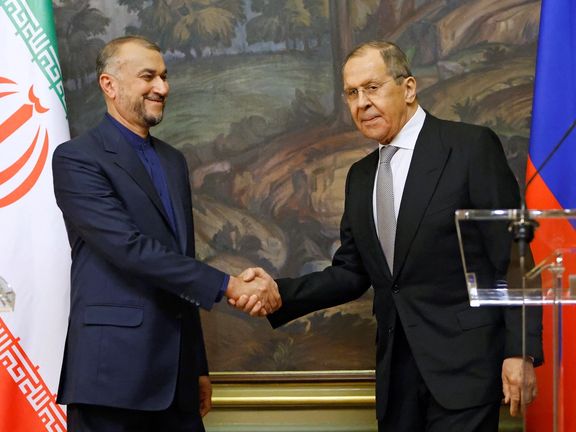
Iran’s foreign minister claims the Islamic Republic does not recognize Russia's annexation of occupied Ukrainian territories.

Iran’s foreign minister claims the Islamic Republic does not recognize Russia's annexation of occupied Ukrainian territories.
In an interview with TRT World, Hossein Amir-Abdollahian said Thursday that despite good relations between Moscow and Tehran, Iran still does not recognize the annexation of Ukrainian territories.
"We recognize the sovereignty and territorial integrity of countries within the framework of international laws, therefore, despite the excellent relations between Tehran and Moscow, we did not recognize the occupation of Crimea, Luhansk, and Donetsk regions," the minister said.
He also claimed that the Islamic Republic opposes the war and hopes for peace in Ukraine.
“When we say that the conflict in Ukraine is not a solution, we believe in our position as a fundamental political principle on which we rely," Amir-Abdollahian said.
His comments came at a time when Tehran signed a trade agreement with the authorities of the self-proclaimed Donetsk Republic back in June.
"At the Saint Petersburg International Economic Forum, the Donetsk People's Republic Chamber of Commerce and Industry and Farnoush Trade, an Iranian Commercial House, signed an agreement that will promote the development of trade and economic relations between our Republic and the Islamic Republic of Iran," wrote Donetsk President Denis Pushilin on social media in June.
However, the Islamic Republic denied the reports.
Iran’s regime is providing military support to Russia in its war against Ukraine by supplying Moscow with kamikaze drones. The US and some other Western countries have imposed sanctions against Tehran for providing the drones that target civilian infrastructures in Ukraine.

Iran’s sports minister has ordered an investigation into alleged sexual abuse of minors at a football school in the northeast of the country.
In a statement on Saturday the sports ministry said Minister Hamid Sadjadi ordered an investigation two weeks ago following reports of sexual abuse at a teenage boys’ football school in the religious city of Mashhad.
A former media manager for the Shahr Khodro football team said on social media that the parents of 15 players from this club have filed a complaint against the club and coaches for sexual assault on their children, reported IRNA Friday.
Shahrara daily, which is affiliated to Mashhad municipality, reported Friday that “families of the children had gathered in front of the headquarters of the provincial football organization to protest this tragedy.”
Since there was no follow-up by the authorities, the families were forced to publicize the case through media, the daily added.
Sexual abuse has made footballschools a serious threat for children and teenagers. Reports say even some mothers of the children receive sexual offers from the coaches and officials of these schools.
Reza Torabian, a former football player, had earlier said that “Some officials of football schools, ask the single moms to have sex in return for letting their kids play in famous teams.”
Sexual abuse of children and teenagers in football schools is not officially reported, but in the last two decades, Iranian media have published numerous reports of child abuse in football schools.

The commander of Iran’s Revolutionary Guard and the parliament speaker threatened Europe on Saturday that listing the IRGC a terror group will bring consequence.
Several Iranian hardliners have threatened the EU of repercussions inside Iran and in the region as well as in Europe if the EU designates the Revolutionary Guards as a terrorist organization.
On Thursday, the European Parliament passed a resolution calling on member states to designate the IRGC as a terrorist group. The overwhelming vote at the EU Parliament came after a massive rally by tens of thousands of Iranian expats in Strasbourg on Monday and condemnation of the IRGC's violent suppression of protesters in Iran.
Ironically, the hardliner officials and politicians who threaten the EU provide further proof of the IRGC's terrorist nature in their bellicose statements.
Ultraconservative lawmaker Mohammad Nabavian said on Wednesday that the Iranian Parliament will put Germany, France and the UK on Iran's terror list if the EU resolution goes any further. Meanwhile, he threatened that "the defenders of the resistance in the region" know very well how to treat those designated as terrorists by Tehran. By "resistance" forces, Nabavian was referring to Iran's proxy groups in Iraq, Syria and Lebanon including the Hezbollah, which have a proven track record of attacking US and EU interests in the region or taking hostages.
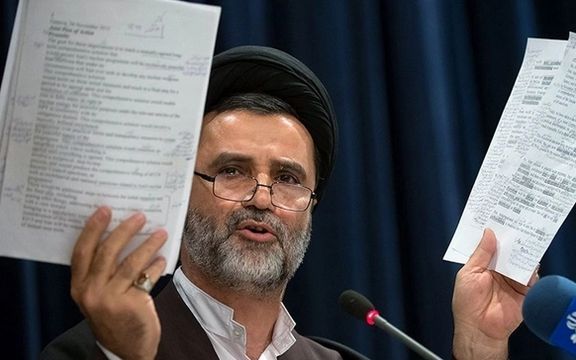
Nabavian further threatened that if Iran's interests are endangered by Europe, the interests of EU member states, their supporters, their companies, will be threatened no matter where they are located."
Ultraconservatives had also vandalized the British and French embassy buildings in Tehran during the past weeks. Nabavian further advised Europeans to "to take Iran's threats seriously."
Referring to former US President Donald Trump administration's designation of the IRGC as a terrorist group, Nabavian said it is not standard practice in the world to sanction the defensive forces of a country.
Meanwhile, IRGC General and hardliner lawmaker Esmail Kowsari warned EU member states: "You may not be able to tolerate the consequences of designating IRGC as a terrorist organization." Kowsari claimed that "The plan put the IRGC on Europe's list of terrorist organizations is a US-Israeli conspiracy and there is no logic behind it."
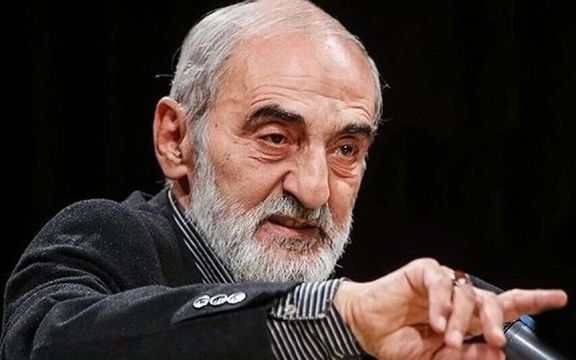
He suggested that "EU member states should preserve their independence from the United States and should oppose any action against the IRGC."Kowsari added that "Those who want Iran to return to the JCPOA know very well that these actions can put an end to any dialogue." He further warned that if the Eu wishes to designate the IRGC as a terrorist organization, it should consider the heavy repercussions of such an act."
This threat has some believers in the West, including the EU foreign policy chief Josep Borrell who is said to oppose designation the IRGC for fear of jeopardizing the revival of the 2015 nuclear deal, or JCPOA.
Kowsari further warned that "The ITRGC is one of the world's most powerful military organizations. Designating it as a terrorist group will not restrict its actions but it might change the situation."
Meanwhile, in another development, Hossein Shariatmadari, the editor of hardliner Kayhan daily in Iran threatened Sweden that IRGC security forces can easily abduct Swedish security officials and bring them to Iran for trial.
He made the outlandish statement while speaking about the trial of a former Iranian judiciary official convicted in Sweden on the charges of participating in killing thousands of dissidents in Iranian prisons in 1988.
In an interview with Eghtesad News, Shariatmadari mentioned other cases in which Iranian security forces abducted individuals from other countries for trial in Iran.
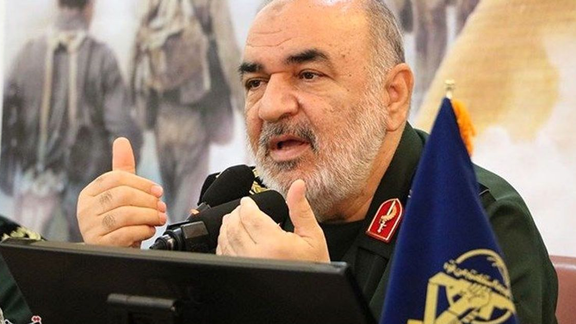
The commander of Iran’s Revolutionary Guard has threatened European states that they will “suffer the consequences” if they designate the IRGC as a terrorist organization.
Hossein Salami said Saturday “Europe has not learned lessons from its past mistakes and thinks it can undermine the IRGC… with such statements,” he declared.
He made the comments after a meeting with the speaker of the Iranian parliament Mohammad Bagher Ghalibaf (Qalibaf).
Salami also claimed that Europe owes its current security to the IRGC, saying “If it wasn’t for the efforts of the IRGC, especially the Quds Force and martyr Soleimani, the terrorism volcano created by the Americans would have engulfed the Europeans and the security that prevails in Europe today would have been destroyed.”
Ghalibaf and other Iranian lawmakers have also threatened European armed forces with a “terrorist” designation.
The Saturday meeting between the IRGC commander and parliament speaker, who is a former IRGC commander, was aimed at coordinating a potential response to the EU’s move.
The European Parliament overwhelmingly passed a resolution Thursday calling on the EU and member states to designate Iran’s Revolutionary Guard as a terrorist group.
The resolution demands Iranian authorities end the crackdown on popular protests that started last September after a 22-year-old woman was killed in hijab police custody.
It also demands that Europe should sanction the Islamic Republic’s Supreme Leader Ali Khamenei and its president Ebrahim Raisi.

As Tehran intensified threats against Europe over prospects of designating the IRGC as a terrorist group, hardliner daily Kayhan threatened military attack on EU forces.
The firebrand Hossein Shariatmadari, the editor of the flagship hardliner newspaper -- which is funded by the Supreme Leader – condemned the European Parliament’s resolution, which was passed overwhelmingly on January 19, calling on the EU to list the IRGC as a terrorist organization.
“The European Union does not know that this action will backfire and make the armed forces of the Islamic Republic’s attacks on the military of the EU member states legal and legitimate,” he said.
Shariatmadari, who often speaks for Ali Khamenei, added that if the EU council acts on the resolution by the parliament and designates the Guards, the Islamic Republic will retaliate and designate "the forces of the European Union member states as terrorists".
Known for his repeated calls to close the Strait of Hormuz in the Persian Gulf in response to any punitive measure against Iran by the international community, Shariatmadari said "In this case, we will deal with them as we deal with other terrorists."
He emphasized that “EU-affiliated forces have been present in the region and are available to us."
The regime’s saber-rattling had started even before the vote but has intensified since the Thursday session.
Malek Shariati, the spokesman of the Parliament's Energy Committee, also threatened that if the IRGC is officially listed as a terrorist group in Europe, "their forces will be terrorists in our opinion, and the entire European commercial transit route in the region will no longer be safe."
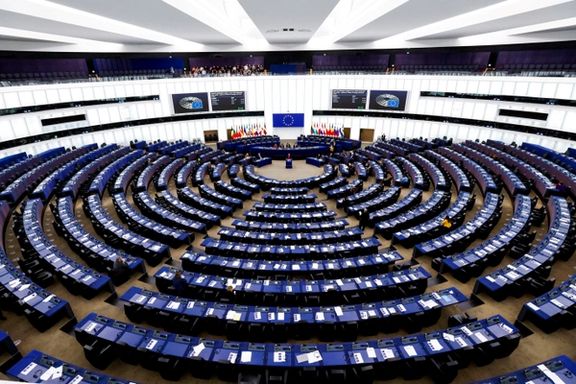
While many Iranians welcomed the European Parliament’s resolution that calls on EU to list the Revolutionary Guard as a terrorist group, regime officials have threatened to respond.
After the European Parliament overwhelmingly passed the resolution Thursday that may eventually lead to the designation of the IRGC, people on social media started to congratulate each other, describing it as yet another victory for their revolt against the clerical regime.
Since the beginning of the current wave of antigovernment protests ignited by a Iranian young woman – Mahsa Amini – the Iran’s government is becoming more isolated in the international community. So far, the Islamic Republic was voted out from the United Nations Commission on the Status of Women (CSW) for policies contrary to the rights of women and girls in December. Another step was by the Geneva-based UN Human Rights Council’s decision on November 24 to launch an independent investigation into the regime’s deadly repression of protests that has killed around 500 civilians, including about 60 children. Several rounds of sanctions by the European Union, the US, Canada and others also targeted officials and entities involved in the crackdown.
According to social media videos, people in some Kurdish cities, including Saqqez – the hometown of Amini -- and Mahabad, came to the streets and rejoiced with fireworks following the approval of the resolution.
Videos sent to Iran International from different cities such as Qom – home to Iran’s biggest seminary -- and the southern city of Bandar Abbas show people distributing candies to celebrate the decision. In one video, someone said that they are watching the European Parliament’s session live on Iran International TV, adding that it is more exciting than the World Cup matches.
Meanwhile, Islamic Republic’s officials, who had started threatening Europe even before the vote, have intensified their rhetoric against European countries over the decision.
Foreign Ministry spokesman Nasser Kanaani said the reason for the designation of IRGC as a terrorist organization is that Europe is infuriated over the IRGC’s leading role in the fight against terrorism. “The reason behind the anger of the ‘global club of terrorists’ is crystal clear. The IRGC is the world’s largest counter-terrorism institution,” he wrote in a tweet on Friday.”
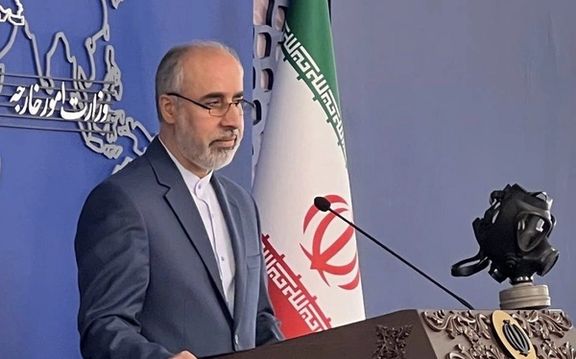
In a statement on Friday, the Army condemned the move, claiming that it exposed the enemies’ grudge against the Islamic establishment in Iran. “The measure of the European Parliament, which claims to be fighting terrorism, against an anti-terrorist institution is out of their desperation and failure in supporting recent riots in Iran,” read the statement.
Hardliner Iranian lawmaker Mohammad Esmail Kowsari, himself a former IRGC commander, said on Friday, "One should ask where the IRGC has committed terrorist acts. They conspired to overthrow the Islamic Republic and the IRGC foiled it." Vowing that the parliament will announce its retaliatory measures on Sunday, he asked, “What part of the IRGC is a terrorist group?”
Criticizing the motion, Speaker of Iran’s parliament, Mohammad Bagher Ghalibaf, said that “If the European Union makes such a decision and lists the Guards as a terrorist organization, it means that the European Union acts as a supporter of terrorism, because the IRGC is the biggest and most successful anti-terrorist entity.”
The whole argument of the Islamic Republic in defense of the IRGC – which has armed proxies in many countries across the region – is its limited role in the battle against the ISIS. But in fact, IRGC was building its own Shiite militant proxy network and to an extent fought against the Sunni extremist group.
The European Parliament cannot decide to designate the IRGC because the terrorists list is not a list decided by the Parliament itself but by the EU Council, comprised of ministers of each EU country. If the resolution garners enough support, it is then upon the national governments of the EU member states to make the final decision. The listing of the IRGC must have a unanimous vote by all 27 EU members in the EU Council.